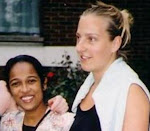 On Friday, I joined a number of the ECO-V team on the first field visit of my stay in Sri Lanka.
On Friday, I joined a number of the ECO-V team on the first field visit of my stay in Sri Lanka.After a four hour mini-bus journey through some beautiful countryside, we arrived at a tank (a man-made reservoir created for irrigation) near to Embilipitiya, close to where ECO-V has been working with many communities.
This tank suffers from a familiar problem - the encroachment of invasive plant species. Specifically, non-native, fast-growing plants, such as water hyacinth (Eichornia crassipes) have colonised the bank - meaning that the effective surface area has been greatly reduced - which has an adverse effect on the tank’s spot-billed pelicans. Complete eradication of these introduced aliens would be almost impossible and, despite causing certain problems, the new plants provide some excellent habitat for other native animals.
 Water hyacinth and invasive reeds have created a new “bank”. In the distance, the trees indicate the historic bank.
Water hyacinth and invasive reeds have created a new “bank”. In the distance, the trees indicate the historic bank. The changes are not so good for the local fishermen who rely on the tank for their livelihoods - the reduced surface area creating greater competition between fishermen. ECO-V had identified that this group are crucial allies for the protection of this wetland, so a careful period of approaches and informal discussions over many months had led to this hour-long meeting between ECO-V, the local fishing association, and a representative of the local waterways authority.
Under the cover of a shelter situated between the tank and the road, we sat on chairs (that had been brought on the back of a motorbike) in a circle.
It was fascinating to watch the meeting unfold. Bearing in mind that during the meeting I had no idea what was being said (it was conducted entirely in Sinhala), I watched as the fishermen and their families were encouraged to passionately share their experiences of the gradual deterioration of their fishing fortunes.
They were then told how, with ECO-V’s help, they can expand their utilisation of the tank. Through ECO-V’s contacts, they can learn to sustainably harvest some of the bank-side plants and develop ecotourism tours - making the most of the fantastic wildlife viewing opportunities. This diversification of income would make them less reliant on access to the fish.
I could tell that the meeting had been a success (even before the subsequent English summary) by the smiling faces of all involved. Expressions of thanks were given: despite knowing that things were wrong with the tank, the fishermen had previously felt powerless to act.
By developing a good relationship with the fishing community, any initiatives to control the invasive plants in the future hopefully will be supported. And through eco-tourism, the fortunes of these stakeholders will be dependent on the maintenance of high biodiversity around the tank, so this habitat should have a greater prospect of being maintained.
After the meeting, we were given a first-hand glimpse of this variety of wildlife as we were taken around the tank in fishing boats. We got close to a great variety of water birds, and you can see photos of many of these by clicking on the link to the Flickr photo stream on the right-hand side.

Pleased that the day had seen a successful step in the conservation of this wetland, we made the long trip back to Colombo - happy and exhausted.
Mark








No comments:
Post a Comment